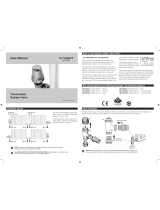Page is loading ...

INSTRUCTION
Radiator Thermostat RAS-C2 Combi
BI-DIRECTIONAL VALVE WITH FLOW-SELECTABLE FEATURE
1
Close all radiator valves by turning
the valve cover cap clockwise.
Leave system to cool.
2
Start boiler/heating.
3
Open one valve and determine
flow direction. Which pipe heats
first?
4
Remove cap and turn setting
ring according to the drawings -
the setting ring is turned by hand
only.
5
Repeat step 3 and 4 until all valves have
been set correctly. Sensor may now be fit-
ted or the valve cap temporarily refitted.
Setting ring
013R9355
013R9355
Installation of valve
The valve is a bi-directional valve * and can be installed
horizontally or vertically in either the flow or return
pipe.
A built in flow direction selection feature can be used to
eliminate the risk of water hammer.
Troubleshooting
In the unlikely event of water hammer being encountered
turn the setting ring (see diagram 4) to the other setting.
Alternatively if commissioning the whole system,
establish the flow direction through each valve using
the diagrams below.
If the flow direction needs to be changed there is
no need to remove the valve, simply turn the setting
ring.
* Maximum pressure drop should not exceed 0.45 bar VISXM302/Danfoss DKCD 05/2011
Keymark reference: This package contains sensor 013G6040, valve 013G6281 (15mm) or valve 013G6283 (8/10 mm)

Removing the Sensor
Turn the sensor to max. position . Turn union nut
anti-clockwise to release lockingmechanism (4). The
sensor can now be separated from the valve.
Setting the desired room temperatures
The desired room temperature is set by turning the head.
The temperatures obtained are approximately:
Installation Guide User Guide
Fitting the Sensor
1. Remove cap from valve and turn sensor to
2. Make sure union nut
is turned loosely up
towards the sensor
body until it is only
slightly free of the lower
part of the sensor body.
3. Press the sensor firmly
onto the valve.
Sensor horizontal:
ensuring that the scale
pointer is at top.
Sensor vertical:
ensuring that the scale
pointer is at the front.
4. Whilst holding the
sensor firmly on the
valve secure connection
by turning union nut
clock-wise by hand.
5. Whilst still holding the
sensor firmly on the
valve fully tighten grey
union nut using parrot
nose pliers.
6. Set desired room
temperature.
Do not cover the thermostat
The thermostat opens and closes as determined by
the temperature around it. Therefore the sensor must
never be hidden behind thick curtains, furniture, etc.
Alternatively a thermostat with remote sensor should
be used.
Lockshield valve (type RLV-D) is only in-
cluded
in codes: 013G6005, 013G6006, 013G6007.
Removal of
protective cap
Balancing
Positive SHUT-OFF feature:
The head can be turned past the setting (a slight
resistance will be felt) to setting "0" at which point the
water flow is shut off completely. After also shutting the
lockshield valve the radiator may be drained and removed
for maintenance and decoration purposes.
What is a thermostatic radiator valve (TRV)?
... an explanation for householders.
TRVs sense the air temperature around them and regulate the flow of water through
the radiator which they are fitted to. They do not control the boiler.
They should be set at a level that gives you the room temperature you want. These
settings may have to be different in each room, and you should set the TRVs to
suit each room and then leave them to do their job.
Turning a TRV to a higher setting will not make the room heat up any faster. How
quickly the room heats up depends on the boiler size and setting, and the radiator size. Turning a TRV to a
lower setting will result in the room being controlled at a lower temperature, and saves energy.
TRVs need a free flow of air to sense the temperature, so they must not be covered by curtains or blocked
by furniture.
TRVs cannot turn off the boiler when the whole house is warm. To do that, you will need a room thermostat as
well. The radiator in the room with the room thermostat should not normally have a TRV, but, if it does, keep
the TRV on the maximum setting and adjust the room thermostat as explained with the instructions.
/
